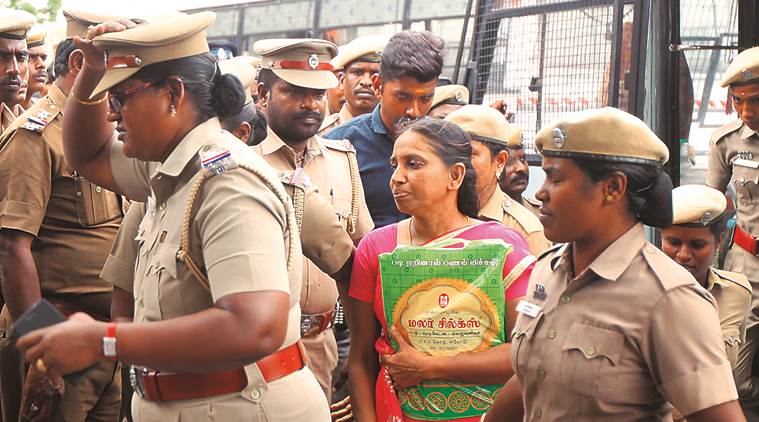
The Madras High Court on Friday granted ordinary parole of 30 days to Nalini, one of the seven convicts in the Rajiv Gandhi assassination case. This is the first time Nalini has been granted an ordinary parole in her 28-year-long incarceration. She had sought the parole for making arrangements for the wedding of her daughter, who was born in prison.
After reaching the High Court in Chennai from the prison in Vellore on Friday afternoon, Nalini read out a statement about her long incarceration before the division bench of Justice M M Sundresh and Justice M Nirmal Kumar. Clad in a pink saree, she was seen fighting tears as she narrated how she and her husband Murugan, both in jail, could not do anything for their daughter’s life and education. Now, she said, they are willing to make arrangements for their daughter’s marriage.
She also cited the critical health condition of Murugan’s father who lives in Sri Lanka and added that the family wants to hold the wedding at the earliest. Her submission said she was willing to obey any rule or condition set by the court during her parole and also added that she cannot afford to pay the huge expenses to make security arrangements for her.
Considering her request, the court exempted Nalini from bearing security costs. However, the court barred her from meeting political leaders, giving interviews to the media and putting up posts on social media.
Nalini broke down three times in court while reading out her statement, in which she sought a parole for six months. After her submission, Justice Sundaresh clarified that her demand for six months’ parole cannot be granted legally as there is no provision for it in the Tamil Nadu Suspension of Sentence Rules, 1982. He said the maximum leave allowed for a convict is 30 days. When a senior counsel translated this to Nalini, she was seen nodding.
After the ruling, Nalini went back to prison. The court has given 10 days to prison authorities to process her parole application by verifying sureties, place of accommodation and making other security arrangements.
Nalini was allowed to appear in person after she made a request before the court, complaining that the state prison department did not respond to her parole request.
This is the first time she has been granted ordinary parole after her arrest in 1991. In 2013, she had sought parole to meet her ailing father, but the state government rejected the plea, citing security reasons. In 2016, she was granted emergency parole of 12 hours to visit her home following her father’s death.
In her plea for a six-month parole, Nalini had cited the premature release and parole granted to several convicts in high-profile crimes. She had also stated that a life convict is entitled to one month’s leave once in two years and she had never availed this for more than 28 years.
Nalini was sentenced to death by a TADA special court and the Supreme Court. The death penalty was commuted to life imprisonment by the Tamil Nadu government in 2000.
Her plea also cited that after commutation of her death sentence, around 3,700 life convicts who had served ten years of imprisonment or less were released by the state government. “My request to the state for premature release under the 1994 scheme of premature release of life convicts was cleared by the council of ministers, and on September 9, 2018, the council advised the governor to release me and other six life convicts in the case. But it has been over six months and the decision of the state still remains unimplemented.”